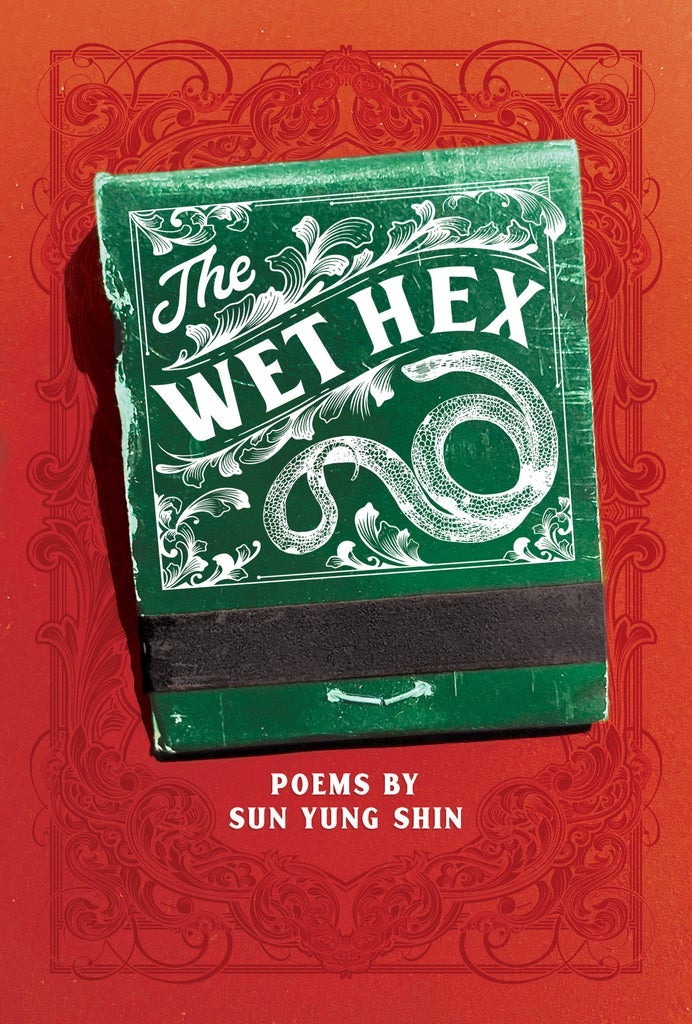
THE WET HEX
Sun Yung Shin calls her readers into the unknown now-future of the human species, an underworld museum of births, deaths, evolutions, and extinctions.
Personal and environmental violations form the backdrop against which Sun Yung Shin examines questions of grievability, violence, and responsibility in The Wet Hex. Incorporating sources such as her own archival immigration documents, Ovid’s Metamorphoses, Christopher Columbus’s journals, and traditional Korean burial rituals, Shin explores the ways that lives are weighed and bartered. Smashing the hierarchies of god and humanity, heaven and hell, in favor of indigenous Korean shamanism and animism, The Wet Hex layers an apocalyptic revision of nineteenth-century imagery of the sublime over the present, conjuring a reality at once beautiful and terrible.
June 2022, Coffee House Press
120 pages, ISBN: 978-1-56689-638-2
THE WET HEX
Sun Yung Shin calls her readers into the unknown now-future of the human species, an underworld museum of births, deaths, evolutions, and extinctions.

Personal and environmental violations form the backdrop against which Sun Yung Shin examines questions of grievability, violence, and responsibility in The Wet Hex. Incorporating sources such as her own archival immigration documents, Ovid’s Metamorphoses, Christopher Columbus’s journals, and traditional Korean burial rituals, Shin explores the ways that lives are weighed and bartered. Smashing the hierarchies of god and humanity, heaven and hell, in favor of indigenous Korean shamanism and animism, The Wet Hex layers an apocalyptic revision of nineteenth-century imagery of the sublime over the present, conjuring a reality at once beautiful and terrible.
June 2022, Coffee House Press
120 pages, ISBN: 978-1-56689-638-2
PRESS + MEDIA
“I left the piece with a feeling predominated by respect for Shin’s freedom of expression, allusion, and refusal to be exploited — not only by agents of government, family, race, gender, identity, but by agents of thought, convention, secondary feeling. What struck me most was the authoritative blending of subtexts, images, and poetic license.”.” —Peter Camilleri, International Examiner
“The Wet Hex flirts with the darkness and the light, playing with form and with expectations. It rages, it remembers, and it questions. Folklore meets personal and collective history, woman meets animal, and end meets beginning in these pages.” —Genevieve Hartman, The Rumpus
“The Wet Hex is a complex collection, one that is difficult to quote or excerpt because every turn of phrase is precise and essential in context. Shin is a rich and talented storyteller, a remarkable lyricist and a highly informed historian who excels at combining her various expertise into a unique, cohesive and impossibly layered collection.” —The Poetry Question
There are many marvels to unpack in The Wet Hex, Sun Yung Shin’s fourth book of poems.” —Poetry Foundation
“Sun Yung Shin’s fourth collection, The Wet Hex (Coffee House Press), is truly astonishing and one of the best books I’ve encountered this year.” —Washington Independent
“In [an] apocalyptic landscape, Shin evinces a deep care for the dead and a call to preserve the living.” —Minneapolis StarTribune
“Enthralling and fantastical. . . . [Shin] begs us to consider what equality looks like for all living things and how that might include the dead, engaging the spiritual, the mythical, and the animal world. While reaching into a variety of realms, from shamanism and funerary rites to the climate crisis and the inheritance of language, Shin’s writing is tight and seamless.” —Katya Buresh, BOMB
“The Wet Hex, born out of the frugal feline year of Korean myths, modernizes and bewitches us with her transfixed vertical, etymological discourse on everything beguiling: fate, moth, white, shaman, casket, box, moon, flower, death. ‘Grief is a heated iron comb,’ which Sun Yung Shin uses to biblically curl your pelagic feline form into gaze, debt, heritage, and threshold. Sun Yung Shin is an enchantress. Sun Yung Shin is oil, resin, feather. Sun Yung Shin is a lexical, chthonic tiger, enraptured specimen of poetic inheritance, roaring from her Minnesota wilderness into the uninhabited, forgiving, concerted retelling of Baridegi’s heroism. Her spellbound language takes us through the hypnotic collaborative corridor between her sequential text and Jinny Yu drawings and profoundly translates its gender muteness into ‘bark, seed, root, horn, organ, petal, oil, tea, tincture,’ obedient materials of healing and transformation. The Wet Hex opens like a mountain, closes its glory with ‘eros of self-sufficiency,’ and is capable of turning the barren woman in you into a virgin or two stones.” —Vi Khi Nao
“The Wet Hex is a worthy monument to this Holocene Epoch. Using images, allusions, and truths that are mystical, metaphorical, empirical, and personal, Sun Yung Shin prevails here as a daughter, and as a mother; these poems transcend our earthly realm like shadow children. Shin is a writer of profound skill and authentic presence. The Wet Hex is canorous, masterful, and utterly unique. It builds on her stellar body of work to advance what’s possible in poetry and art.” —Michael Kleber-Diggs
“Drop everything! Sun Yung Shin’s new book has arrived: a rich biomythography, a feminist epic, a pilgrimage to the underworld. With tigers, wolves, lost ancestors, and sky, she stages encounters with death, afterbirth and afterlife, haunting/hunting. Who is the animal? What does the orphan dream? How does an abandoned princess raise the dead? Read these poems to find out. Here spells are cast. The hex drips wet. The castaways come home.” —Gabrielle Civil
“The Wet Hex is a brilliant achievement seeking liberation for girls, women, orphans, and castaways. The poems interrogate violence in a haunting, gorgeous spell of lyric alchemy that only Sun Yung Shin can create. Shin ‘let[s] the wolves out of [her] mouth’ and charts a map for ‘the fallen, the wandering, the abandoned.’ Once again, she proves that she is a poet ahead of the curve, an intellectual and innovative wonder. This is one of my favorite poets. This is the most powerful book of poems I’ve read in years.” —Lee Herrick
